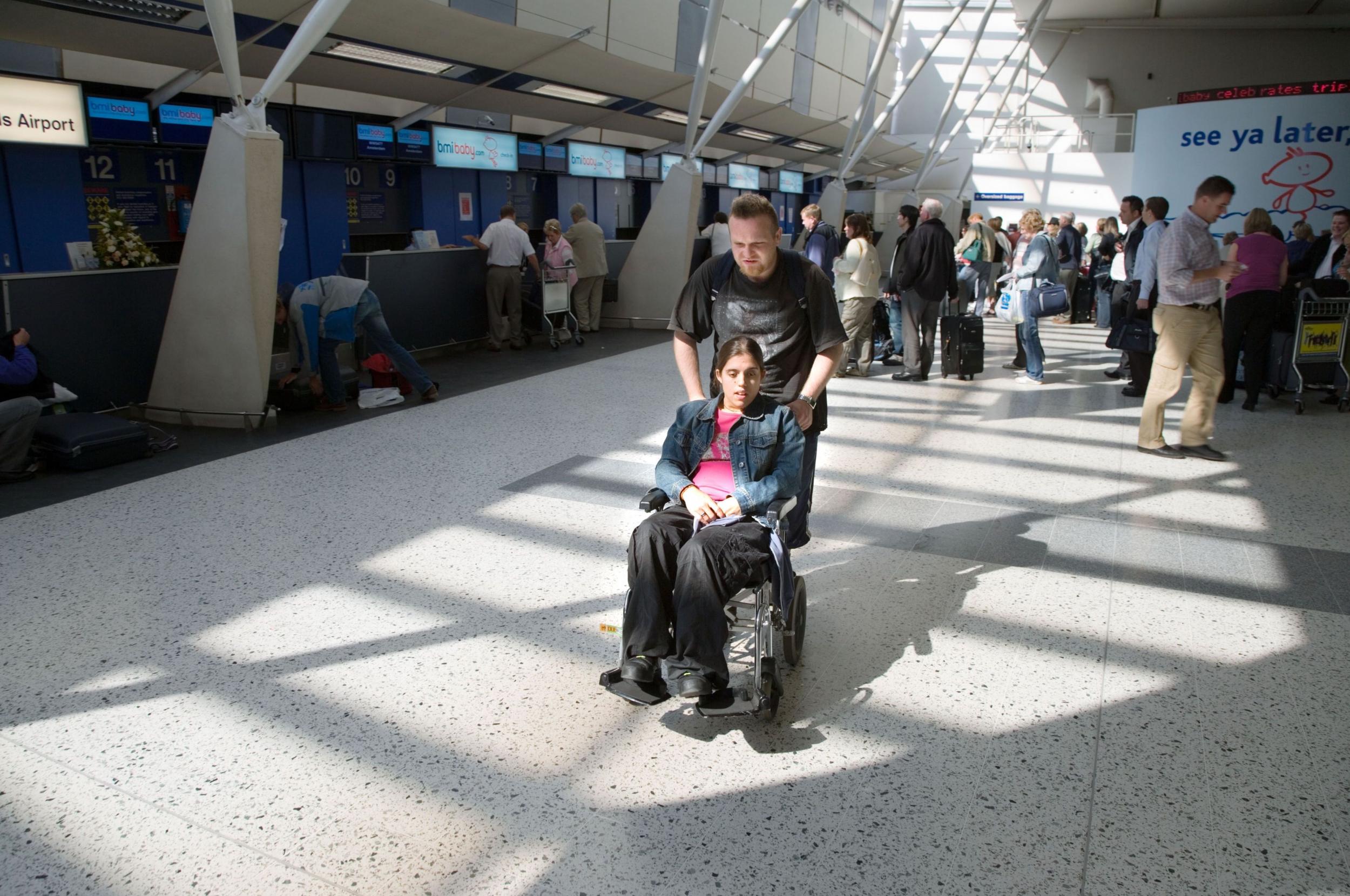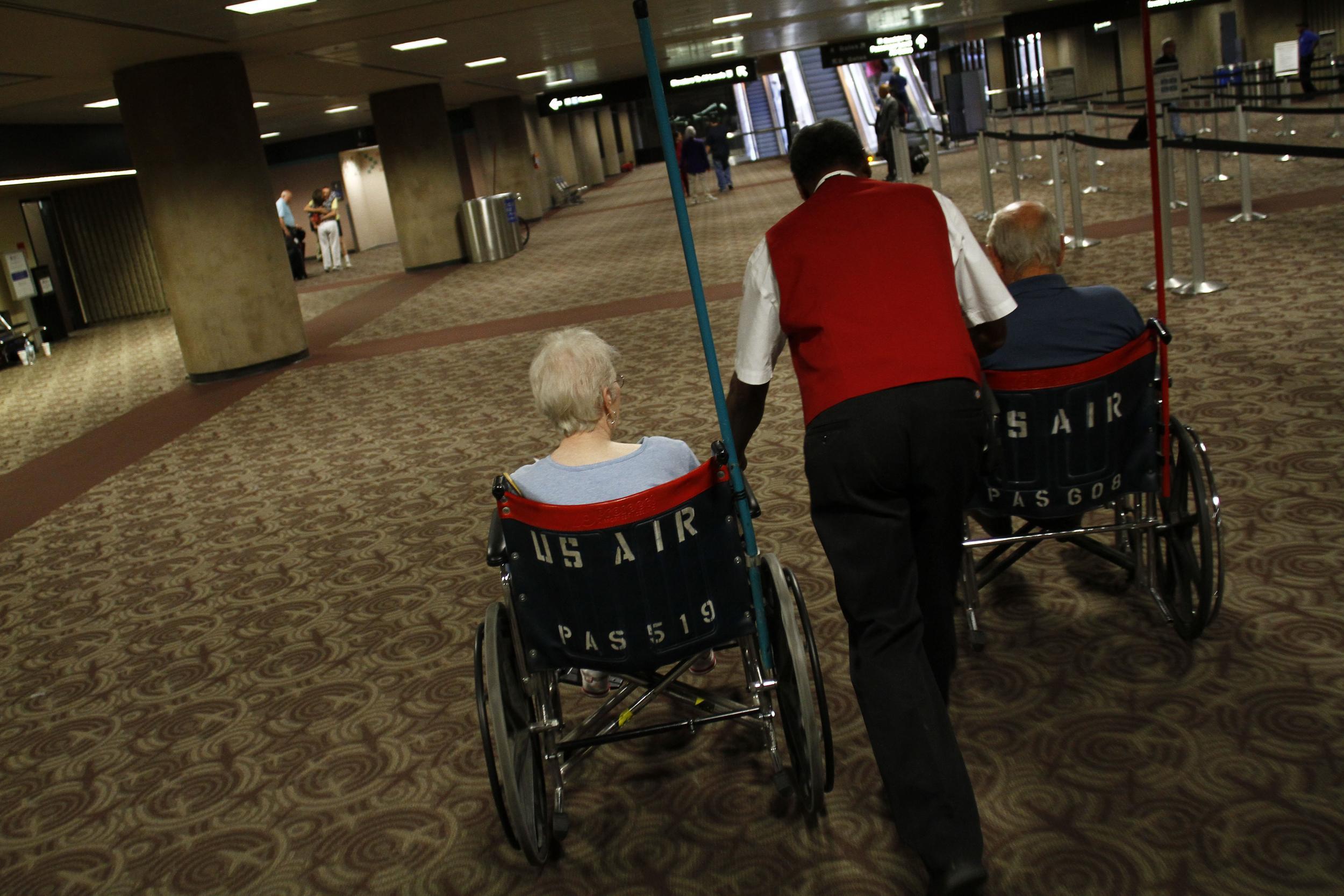Why 'airport wheelchair imposters' don't exist
Yes, people who don’t permanently use wheelchairs often use them at airports. Get over it, says Julia Buckley

“Lazy” travellers are faking disabilities to get pushed through airports in a wheelchair, says a story in The Sun today.
People who aren’t permanent wheelchair users are using wheelchairs to cover long distances and sit through long queues – the horror! Clearly, they must be faking it. For the perks, you know – the ability to pre-board and sit in their uncomfortable plane seats for five minutes longer than everyone else. For the off-colour comments from flight attendants annoyed that their boarding process is being delayed and they might have to pop a bag in the overhead locker. For the necessity of waiting for the entire plane to disembark before being offloaded like cattle. With perks like this, who wouldn’t fake it?
Let’s get one thing clear about this nasty little idea, as insidious as the premise that people on disability benefits are milking the system: nobody in their right mind would fake a disability at an airport.
As someone who’s used assistance on and off for the past five years, I can promise you that. Not just because of the nuts and bolts – the insistence that you must arrive at the airport no later than two hours before your flight to catch it (I was told by a BA staffer at Gatwick recently that cripples should arrive at least three hours early); the manhandling (passengers with no mobility are dragged off their seats and into aisle chairs by picking them up under the arms, as you would a cat; every single flight I take, the usually male assistant will try, without asking, to physically part my legs and slam my carry-on between them); the way you’re completely and utterly divested of agency when you’re being assisted, having to ask permission to go to the toilet – and having your need for a wee broadcast over the radio between assistance, the gate, and, bizarrely, passport control, as happened to me again at Gatwick this year.
No, the main reason you’d be crazy to ask for a wheelchair you didn’t need is because the way people treat you when you request assistance – especially if you “don’t look ill” – is enough to make you lose all faith in humanity after just one flight.
Invisible illness is a funny thing. The good news is that you don’t look ill – so you don’t get the outright prejudice and hostility that permanent wheelchair users often face. The bad is that people tend not to believe there’s anything wrong with you – especially if, heaven forfend, your medical condition is reaping you a “perk”.
If you must know, I have a hidden medical condition that used to cause unceasing pain and make me walk with a stick. The pain is gone, but my genetics haven’t changed, so now, occasionally I still book assistance as a protective measure – I feel fine, but I might dislocate my shoulder if I put my bag in the overhead locker, I’m hunky dory right now, but sitting for 12 hours on a plane will mean I’ll be stiff and achy on arrival. Sometimes I walk onto planes and get assisted off. Sometimes it’s the other way round. Does that mean I’m faking it? No, it means I know my condition, can anticipate my needs, and am trying to save everyone’s time and my dignity.
But that’s not what other people think. I’ve been accused of booking assistance in order to sit down and drink a coffee as I’m chauffeured to the gate like some kind of empress. I’ve been accused of being drunk. I’ve been accused of packing a bag so heavy that it’s impossible to lift and scolded like a toddler when I’ve explained to cabin crew that reaching overhead can dislocate my shoulder, so could they please be so kind as to pop my laptop case in the locker.
And that’s not even talking about the general disdain many airport workers, cabin crew and fellow passengers have towards people needing assistance. “Can’t you just get the bus with everyone else? You’re holding us up,” I have been asked by a gate manager at Gatwick. “That’s not fair, she’s queue-jumping,” a woman once shouted at me at Heathrow as a member of assistance staff pushed me – in a wheelchair, looking half-dead after flying in from LA to connect to Dublin – to the front of the line for security. “If you need a wheelchair, how come you were able to walk to the front of the plane?” a member of cabin crew on Air Europa once asked me. I fly so much that I have gold-tier status with British Airways – one of the snobby perks of which is that pursers are meant to personally welcome you onboard and thank you for your custom – but last year, on a flight to Johannesburg, the purser was so insistent that I, a cripple, couldn’t be a frequent flyer (let alone a cripple sitting in business class) that she looked me up and down, looked enormously confused, triple-checked her VIP list against their seat numbers, then turned to the man next to me, and said, “Mr Buckley, welcome onboard.”
So forgive me if I’m angry about this idea that fakes abound in the special assistance system, but it’s an insidious premise that latches onto people’s worst natures and most outrageous suspicions – and it’s simply not true.

Sure, there is some fakery – just as there is with anything in life. I’ve been on several flights with Southwest – a US airline that doesn’t preassign seats, meaning it’s a boarding bun-fight – when I have clocked people who clearly appear to be inventing a need to pre-board. You don’t need my cripple-dar to spot them – they’re the ones who labour up to the desk as if they’re gunning for an Oscar, then leap out of the chair at the aircraft door and sprint to a cushy seat. Obviously, when it comes to disembarking, they rush off with everyone else, instead of waiting for assistance as they’re supposed to.
But they’re few and far between – and as I once said to a flight attendant who was making snide comments about “miraculous healings”, people have diverse needs, levels of pain and disability can change from one minute to the next, and it’s not our place to judge whether or not someone needs help. Apart from anything else, if someone really wants to invent a disability to pre-board a plane, that’s between them and their karma.
The problem is “widespread”, says The Sun, because passengers don’t have to provide “documents proving” their disability. I should hope not – are airport workers the Stasi? Are they doctors needing to work out a treatment plan? Should I have to explain the multiple ramifications of my rare genetic condition when I’m just asking someone to lift my case onto my lap instead of shove it between my legs? If a pregnant woman wants a seat on the Tube, should she have to whip out a copy of her sonogram?
Roberto Castiglioni of Reduced Mobility Rights, who advocates for passengers with disabilities, agrees. “Abuse exists, but it’s not as widespread as the article suggests,” he told me today.
“Abuse of wheelchair services is more common in the United States where queues at security checkpoints tend to be longer. The solution to this problem is to expedite the experience for all passengers, something TSA [the Transportation Security Administration] are constantly looking to improve.
“As far as the UK is concerned, there are pockets of abuse with flights originating from certain Asian destinations. This is not down to skipping the line, though – rather, it’s giving passengers some sort of free ‘meet and assist’ service, especially for people who do not speak English and would have problems navigating an airport after disembarking a flight.”
In fact, there used to be a meet and assist option at UK airports for passengers with poor English skills – someone would come to a flight and escort non-English speakers in big groups through security. But that stopped a few years ago – cost-cutting measures, I assume – and so now, some people concerned about navigating the airport do book assistance.
But turning annoyance at a few bad apples into an assumption that all the apples on the tree are rotten is pretty despicable. And it’s not just The Sun; google “airport wheelchair imposters” and you’ll find plenty of outlets who’ve piled on in the past.
Airports are huge. They involve walking long distances, queuing for long lengths of time, lifting and carrying, and then squeezing yourself into seats that weren’t built with your health or comfort in mind. It’s tiring. I walked through Heathrow’s flagship new Terminal Two last month and calculated it was over a mile’s walk from check-in to the first gate area.
There are many people who need assistance with all that. People with disabilities. People with hidden disabilities. People going through certain treatments for disease, like chemo or dialysis. Pregnant people. Elderly people. People with chronic pain. People who can do slopes, but not steps. People who can do steps, but not long distances. All these are people who can, technically walk – who can, as The Sun snidely says, “hop out” of their wheelchair when they’re required to get on the plane. It doesn’t mean they’re lazy, or that they’re making it up.
Travel should be fun. Travelling with assistance is not fun. And anyone who’s ever had to do it can tell you that.
Join our commenting forum
Join thought-provoking conversations, follow other Independent readers and see their replies
Comments